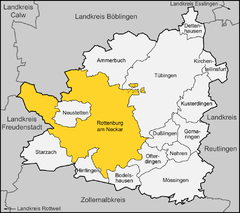This article needs additional citations for verification. (December 2015) |
Rottenburg am Neckar | |
|---|---|
 River Neckar in Rottenburg | |
Location of Rottenburg am Neckar within Tübingen district  | |
| Coordinates: 48°28′38″N 08°56′04″E / 48.47722°N 8.93444°E | |
| Country | Germany |
| State | Baden-Württemberg |
| Admin. region | Tübingen |
| District | Tübingen |
| Government | |
| • Lord mayor (2024–32) | Stephan Neher[1] |
| Area | |
• Total | 142.26 km2 (54.93 sq mi) |
| Elevation | 349 m (1,145 ft) |
| Population (2022-12-31)[2] | |
• Total | 44,653 |
| • Density | 310/km2 (810/sq mi) |
| Time zone | UTC+01:00 (CET) |
| • Summer (DST) | UTC+02:00 (CEST) |
| Postal codes | 72101–72108 |
| Dialling codes | 07472, 07478, 07457, 07073 |
| Vehicle registration | TÜ |
| Website | www |
Rottenburg am Neckar (German: [ˈʁɔtn̩bʊʁk ʔam ˈnɛkaʁ] ; until 10 July 1964 only Rottenburg; Swabian: Raodaburg) is a medium-sized town in the administrative district (Landkreis) of Tübingen in Baden-Württemberg, Germany. It lies about 50 kilometres (31 miles) southwest of the provincial capital Stuttgart and about 12 km (7 mi) southwest of the district town Tübingen. Rottenburg is the second-largest town of the district after Tübingen and makes up a secondary centre for the surrounding community. Since 1 May 1972, Rottenburg am Neckar has been a district town (Große Kreisstadt). Rottenburg agreed to an administrative collective with the municipalities of Hirrlingen, Neustetten and Starzach.
Rottenburg is the seat of a Roman Catholic bishop, being the official centre of the diocese of Rottenburg-Stuttgart. Moreover, it has a college of church music and a university of applied sciences (German Fachhochschule), specialising in forestry.
- ^ Oberbürgermeisterwahl Rottenburg am Neckar 2024, Staatsanzeiger. Retrieved 12 June 2024.
- ^ "Bevölkerung nach Nationalität und Geschlecht am 31. Dezember 2022" [Population by nationality and sex as of December 31, 2022] (CSV) (in German). Statistisches Landesamt Baden-Württemberg. June 2023.


